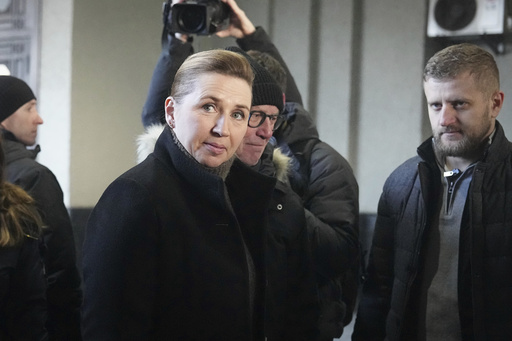KYIV, Ukraine — On Monday, a group of twelve leaders from Europe and Canada gathered in Ukraine’s capital to commemorate the third anniversary of the ongoing conflict with Russia. This visit underscored a strong show of solidarity for Kyiv, particularly in light of growing concerns regarding the commitment of the Trump administration to support Ukraine against the Russian invasion.
Among the notable attendees were European Commission President Ursula von der Leyen and Canadian Prime Minister Justin Trudeau, who were welcomed at the train station by Ukrainian Foreign Minister Andrii Sybiha and the chief of staff to the president, Andrii Yermak.
In a post on social media platform X, von der Leyen expressed that Europe stands with Ukraine, emphasizing, “We are in Kyiv because Ukraine is in Europe.” She further stated, “In this fight for survival, it is not only the destiny of Ukraine that is at stake. It’s Europe’s destiny.” This statement reflects the shared concerns among European leaders about the implications of the conflict not only for Ukraine but for the entire continent.
The recent behavior of U.S. President Donald Trump has left Ukrainian and European officials uneasy. Trump has described Ukrainian President Volodymyr Zelenskyy in unflattering terms, labeling him as a dictator, and has suggested that Ukraine bears responsibility for the ongoing war. Additionally, he recently took steps to end the isolation of Russian President Vladimir Putin, raising concerns that U.S. support for Ukraine is waning. Reports indicate that the U.S. may not support Ukraine’s aspirations to join NATO and is unlikely to assist in reclaiming territories occupied by Russian forces, which account for nearly 20% of Ukraine’s land.
Meanwhile, as Russian troops continue to make steady advances on the battlefield, Ukraine faces challenges such as troop shortages and lack of weapons.
The leaders visiting Kyiv included European Council President Antonio Costa and prime ministers from various Northern European nations and Spain. They planned to engage in discussions with Zelenskyy about ongoing support for Ukraine during their stay, which was filled with events marking the anniversary.
The recent shifts in U.S. foreign policy have sparked alarm across Europe, as governments express fears of being sidelined in negotiations for a peace agreement. They are considering the implications on U.S. aid to Ukraine and how they might compensate for any possible reduction. Costa announced plans for an emergency summit of European Union leaders to discuss the situation in Ukraine, scheduled for March 6 in Brussels, asserting that this moment is defining for both Ukraine and European security.
British Prime Minister Keir Starmer and French President Emmanuel Macron are both set to travel to Washington this week, likely to discuss the evolving conflict. In a notable move, EU foreign ministers have approved a fresh set of sanctions against Russia, targeting what is described as Russia’s “shadow fleet” — vessels that evade sanctions on oil and gas transport or carry stolen grain from Ukraine. A total of 74 ships have been added to the EU’s shadow fleet list, along with asset freezes and travel bans imposed on 83 individuals and entities connected to the Russian government or businesses.
During this critical time for Ukraine, the EU’s chief diplomat, Kaja Kallas, emphasized that any peace deal with Russia must involve the consent of Ukraine and Europe, stating to reporters, “You can discuss whatever you want with Putin. But if it comes to Europe or Ukraine, then Ukraine and Europe have to agree to this deal.” Kallas is scheduled to meet with U.S. Secretary of State Marco Rubio in Washington.
United Nations Secretary-General António Guterres remarked on the grim anniversary of the war, noting the extensive loss of life and destruction, with over 12,600 civilians reported killed. Amid the turmoil, Ukrainian officials continue to express mistrust toward Moscow’s intentions.
In a significant escalation, Russia launched its largest drone attack of the war, deploying 267 drones against Ukraine just as discussions of peace were emerging. The Russian foreign ministry has indicated preparations for a meeting between Trump and Putin, while U.S. officials affirmed their goal of rekindling diplomatic relations and economic collaboration with Russia.
Kallas rebuffed Trump’s labeling of Zelenskyy as a dictator, underscoring that democratic elections are not feasible in Ukraine under martial law, which remains in effect. Following a decisive win in recent German elections, conservative leader Friedrich Merz expressed his unwavering support for Ukraine, advocating that a nation under attack must have a say in any peace negotiations.
The United Kingdom is also expected to announce new sanctions against Russia, marking one of the most extensive rounds since the conflict began, aimed at undermining its military capabilities and reducing revenues.


